eCommerce: Artificial Intelligence
Artificial Intelligence in Italy eCommerce: Consumer Behavior & Preferences
How do online shoppers in Italy feel about AI? Read on for consumer insights on willingness to use, feature awareness, and top concerns like privacy and accuracy.
Article by Cihan Uzunoglu | October 09, 2024Download
Coming soon
Share

Artificial Intelligence in Italy’s eCommerce: Key Insights
AI’s Potential: Nearly half of Italian online shoppers, based on the Top Shop survey by ECDB and Statista, think AI has the ability to enhance their shopping experience. Optimism is strongest among younger and wealthier shoppers, while older and lower-income consumers remain more skeptical.
Openness to AI: Most shoppers in Italy are willing to use AI when buying online, with enthusiasm being highest among younger, wealthier individuals and those in larger cities.
Familiarity with AI Features: The most well-known AI tools among Italian shoppers are chatbots for customer service, automated price comparisons, and product recommendations.
Main AI Concerns: Shoppers are mainly concerned about the accuracy of AI recommendations and privacy issues. Women and older shoppers worry more about privacy and losing the human touch, while younger consumers and men are more focused on the accuracy of AI.
Artificial intelligence (AI) is everywhere, from chatbots to personalized shopping suggestions, but how do Italian consumers feel about using it while shopping online?
With Italy leading in AI regulation and Microsoft’s multi-billion euro investment in the country’s AI infrastructure, AI is set to play an even larger role in eCommerce. But how willing are shoppers to embrace this shift, and what concerns are holding them back?
Using data from Top Shop survey by ECDB and Statista, let’s dive into what the findings reveal about AI's impact on Italian online shopping.
Majority of Online Shoppers in Italy Believe in AI’s Impact on eCommerce
According to the survey data, nearly half of Italian online shoppers believe that AI has the potential to enhance their shopping experience to an extent. While a smaller portion of shoppers are strongly optimistic, others remain neutral or skeptical:
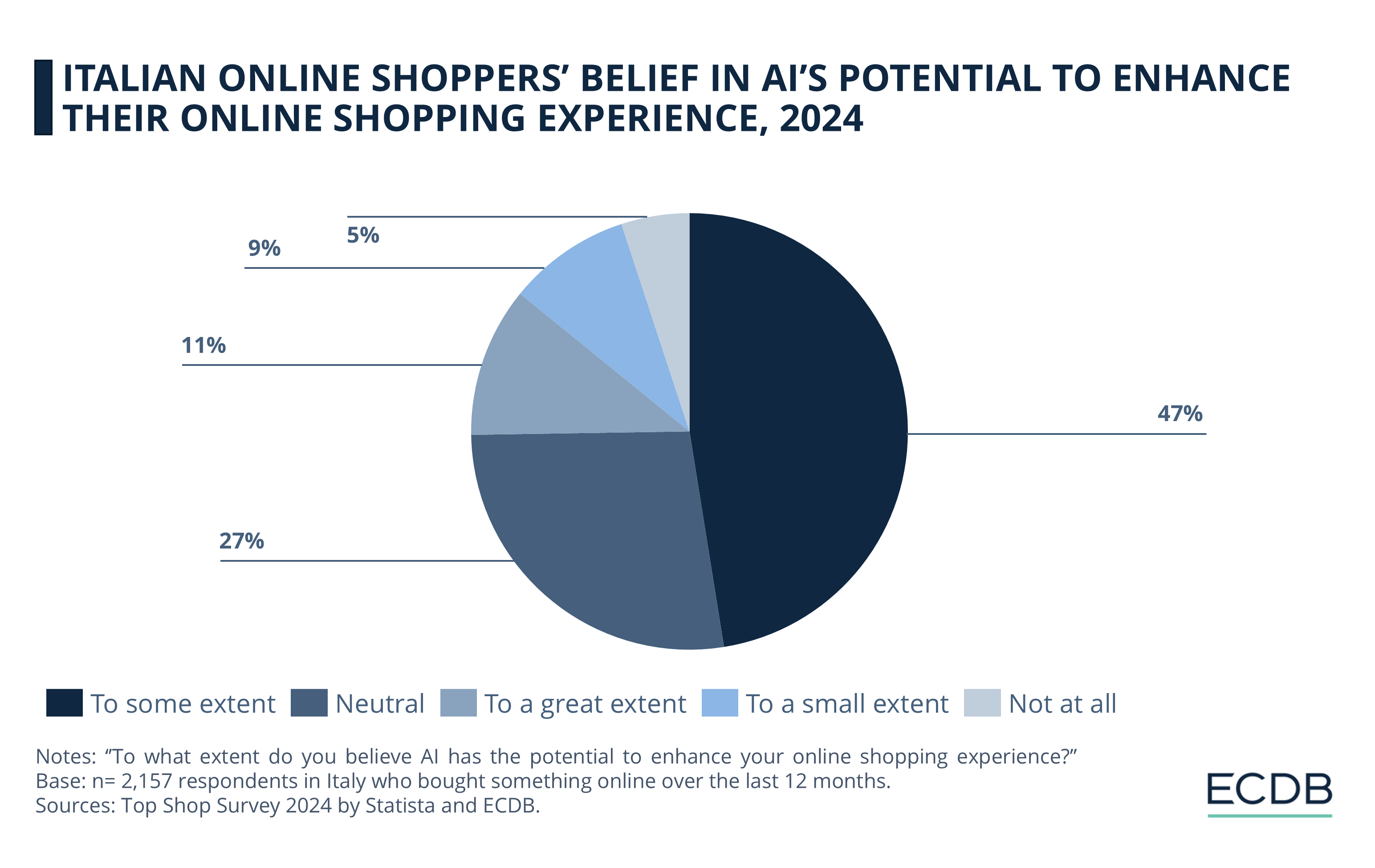
To a great extent, 11% of shoppers believe in AI’s potential to significantly improve their online shopping experience. A larger group, 47%, feels that AI could improve their experience to some extent.
Meanwhile, 9% believe AI could only enhance their shopping experience to a small extent. Neutral shoppers make up 27% of the total.
On the more skeptical end, 5% of shoppers do not believe that AI has any potential to enhance their online shopping experience.
Looking at different demographics, we see that male shoppers are generally less skeptical about AI’s role in eCommerce. Consumers aged 25-34 are the most optimistic about AI’s potential, with older shoppers being more doubtful.
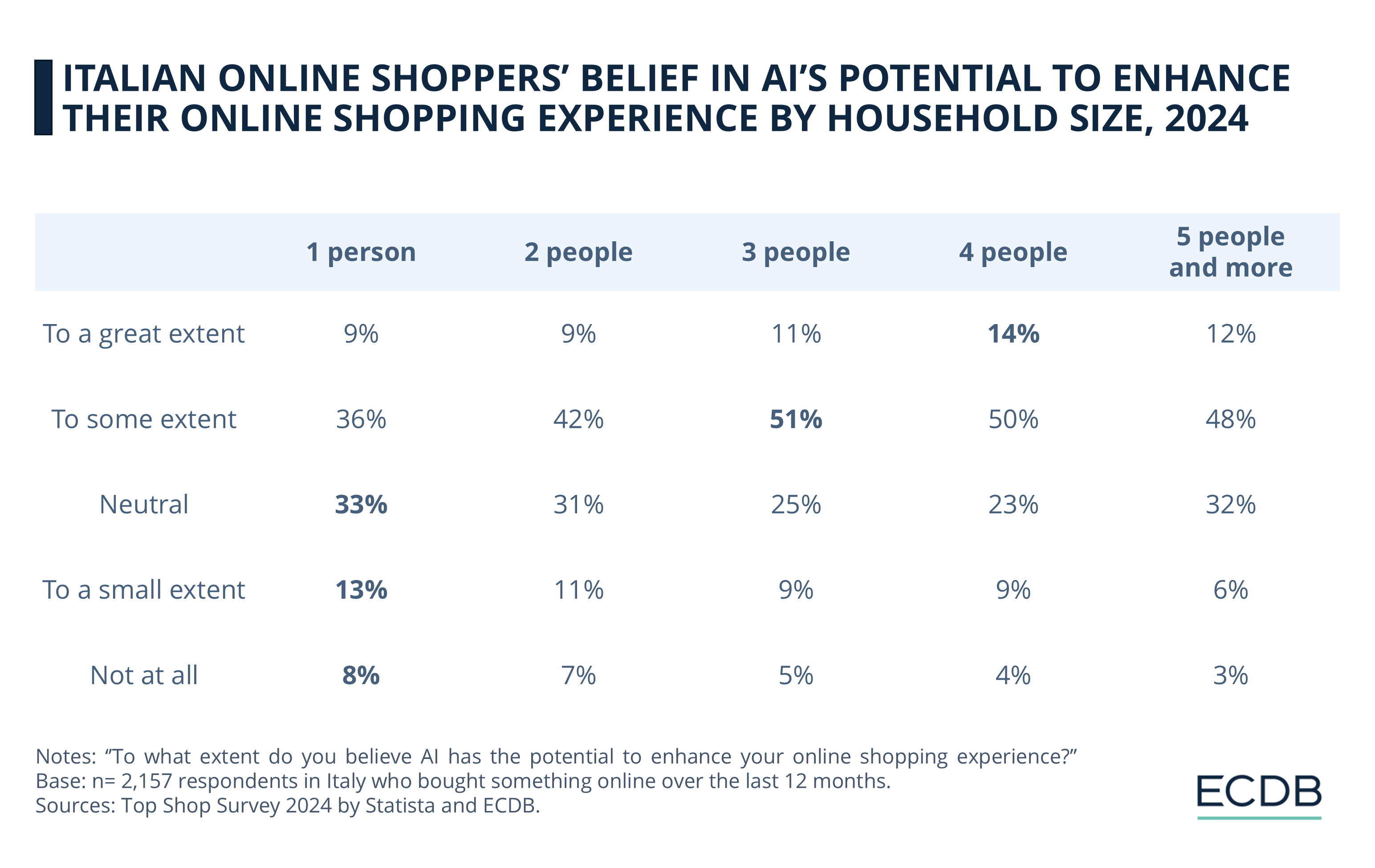
Higher-income consumers tend to be more positive about AI’s benefits, while skepticism is higher among lower-income shoppers. Larger households generally hold a more positive view of AI’s ability to improve shopping, while residents of the smallest towns (with less than 5,000 people) are less confident in AI’s impact on eCommerce.
Two Thirds of Online Shoppers in Italy Are Willing to Use AI
Believing in the impact of AI on online shopping is one thing, but do Italian online shoppers really want to use AI when buying products online?

According to the data, the majority of online shoppers in Italy are either somewhat or very willing to use AI features when purchasing products online. A significant portion remains neutral, while only a small percentage expresses reluctance:
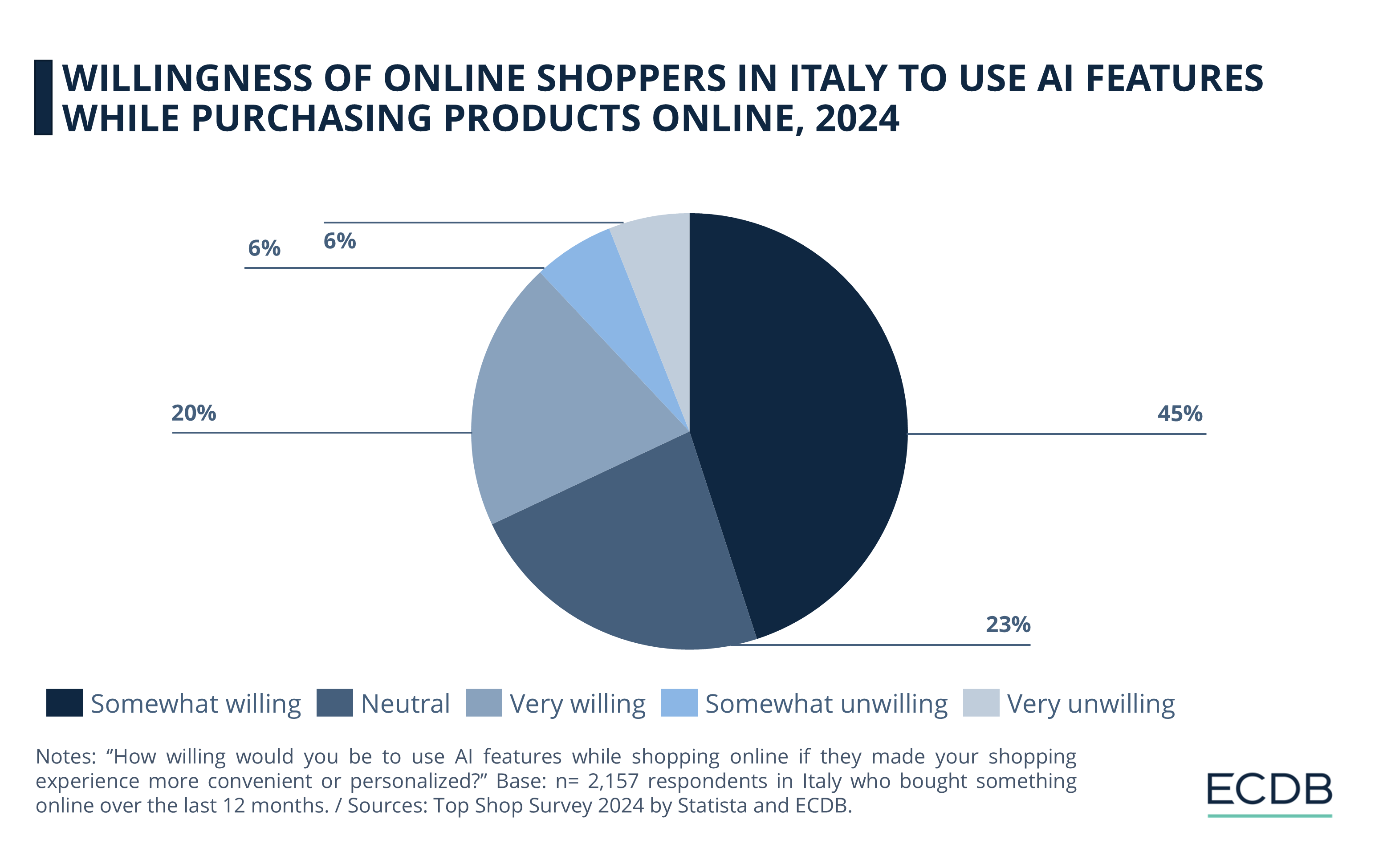
Very willing and somewhat willing shoppers make up the largest group, with 20% of shoppers being very willing to adopt AI while shopping online, and 45% somewhat willing to use AI features.
Neutral shoppers represent 23% of the total, showing neither strong willingness nor reluctance towards using AI.
On the other hand, a smaller group expresses reluctance, with 6% of shoppers being somewhat unwilling to use AI, and another 6% very unwilling to adopt AI features.
While the majority of shoppers express interest in AI, certain groups are more enthusiastic than others. Male shoppers are slightly more willing than females to engage with AI if it improves their shopping experience. Younger shoppers, in particular, are notably more open to using AI features in their online shopping, with willingness decreasing as age increases.
High-income shoppers show the greatest likelihood of adopting AI for online purchases, while those with lower incomes are less inclined to use AI. Additionally, consumers living in multi-person households are more likely to embrace AI if it adds convenience to their shopping. Finally, residents of larger cities are significantly more open to using AI in eCommerce, with those in smaller towns showing less enthusiasm.

AI-Powered Chatbots are Recognized by Italian Online Shoppers
As AI technology improves, we're becoming more accustomed to its use in online shopping. How aware are online shoppers in Italy of certain AI features implemented in eCommerce?
Like this insight? It is based on our regularly updated rankings. With our retailer and country rankings, you can learn valuable information about your specific market. Our product category rankings and benchmarks allow you to see where various businesses are currently evolving. This information can aid in your decision-making, whether you are a business developer, shop owner, or CEO of a large eCommerce brand. Stay a step ahead of the market with ECDB.
As per our survey results, the most recognized features include chatbots for customer service, automated price comparisons, and personalized product recommendations:
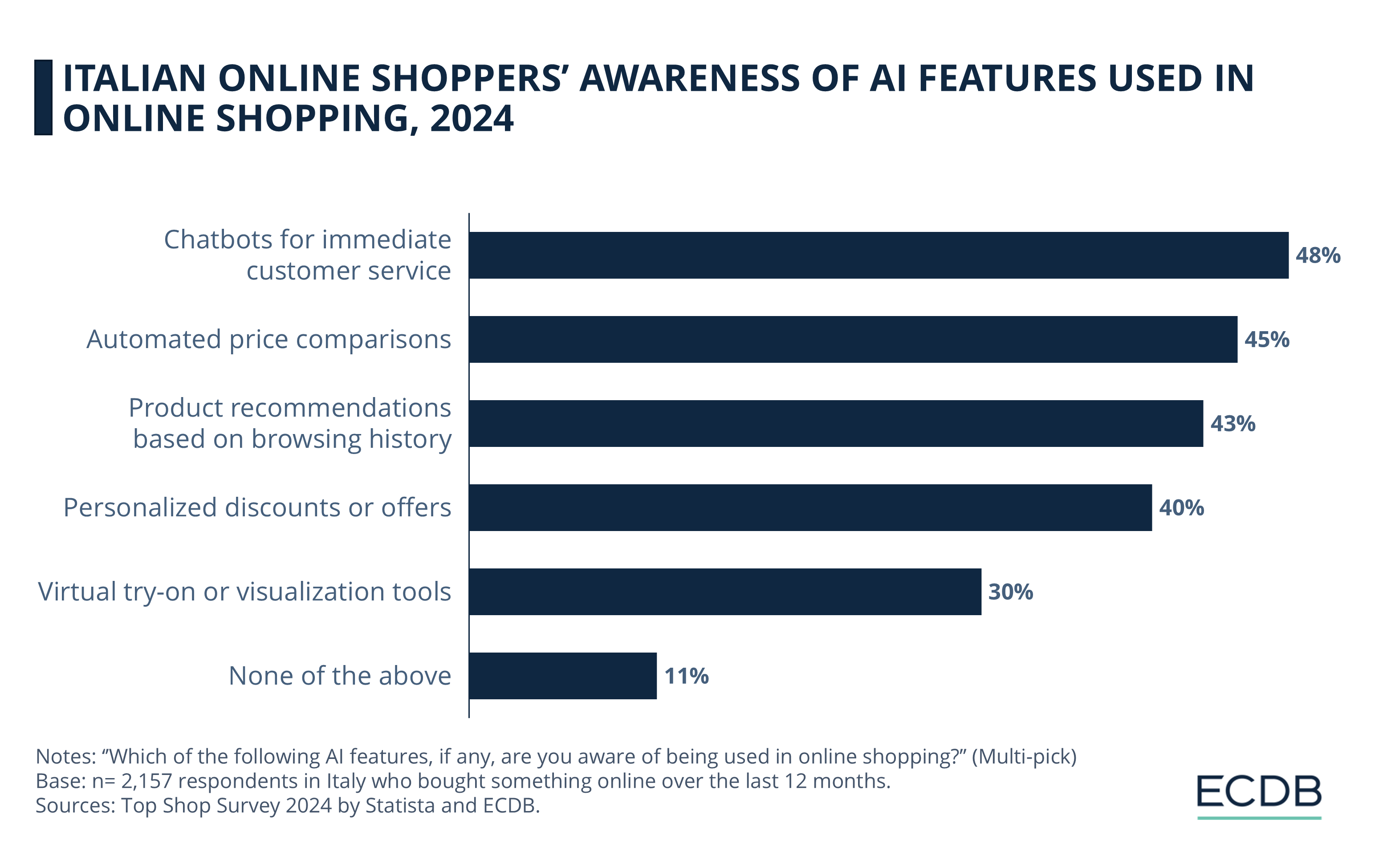
According to the data, 48% of online shoppers in Italy are aware of chatbots for immediate customer service. Awareness of automated price comparisons follows closely, with 45% of shoppers familiar with this tool.
Product recommendations based on browsing history are also well-known, with 43% of shoppers recognizing this feature.
Personalized discounts or offers are known by 40% of shoppers, while virtual try-on or visualization tools are less familiar, with only 30% awareness.
However, awareness shifts based on various demographics. Younger shoppers, for instance, are generally more familiar with chatbots and personalized discount offers, though virtual try-on tools remain the least known feature across all age groups.

Female shoppers tend to be more aware of chatbots and virtual try-on tools, whereas men are more familiar with price comparison tools.
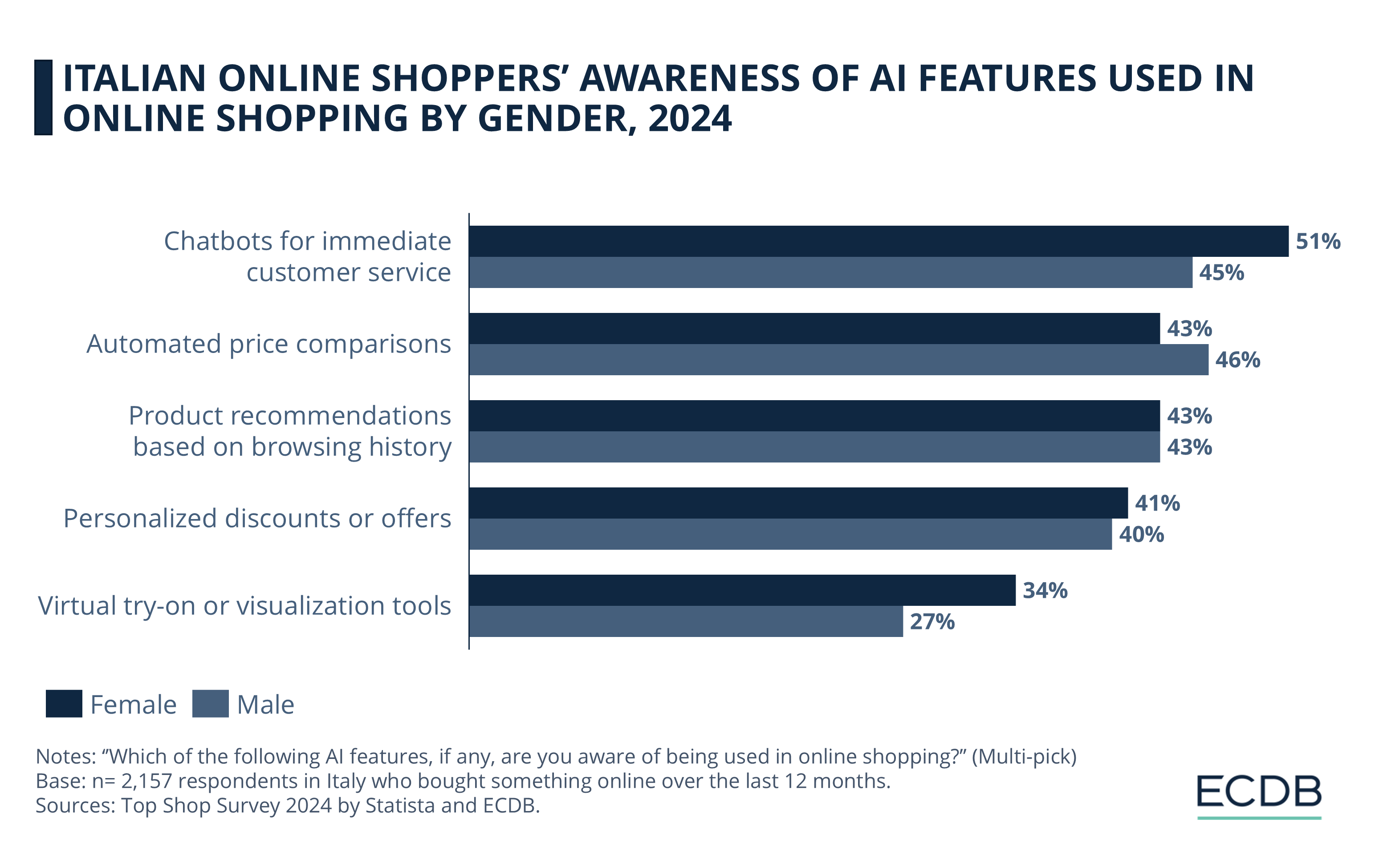
High-income shoppers are generally more aware of AI-powered eCommerce features, except for personalized discount offers, which remain least understood by lower-income shoppers.
Furthermore, larger households, with three or more people, are more knowledgeable about AI features compared to smaller households. Shoppers from larger cities are also more aware of AI technologies in eCommerce, while those in the smallest towns are the least familiar.
Accuracy and Security Are Top AI Concerns Among Italian Online Shoppers
Despite the optimism surrounding AI, concerns among Italian online shoppers remain. While we’re far from dealing with sentient robots taking over, shoppers are already focused on more immediate issues – particularly the accuracy of AI-driven recommendations and privacy concerns:
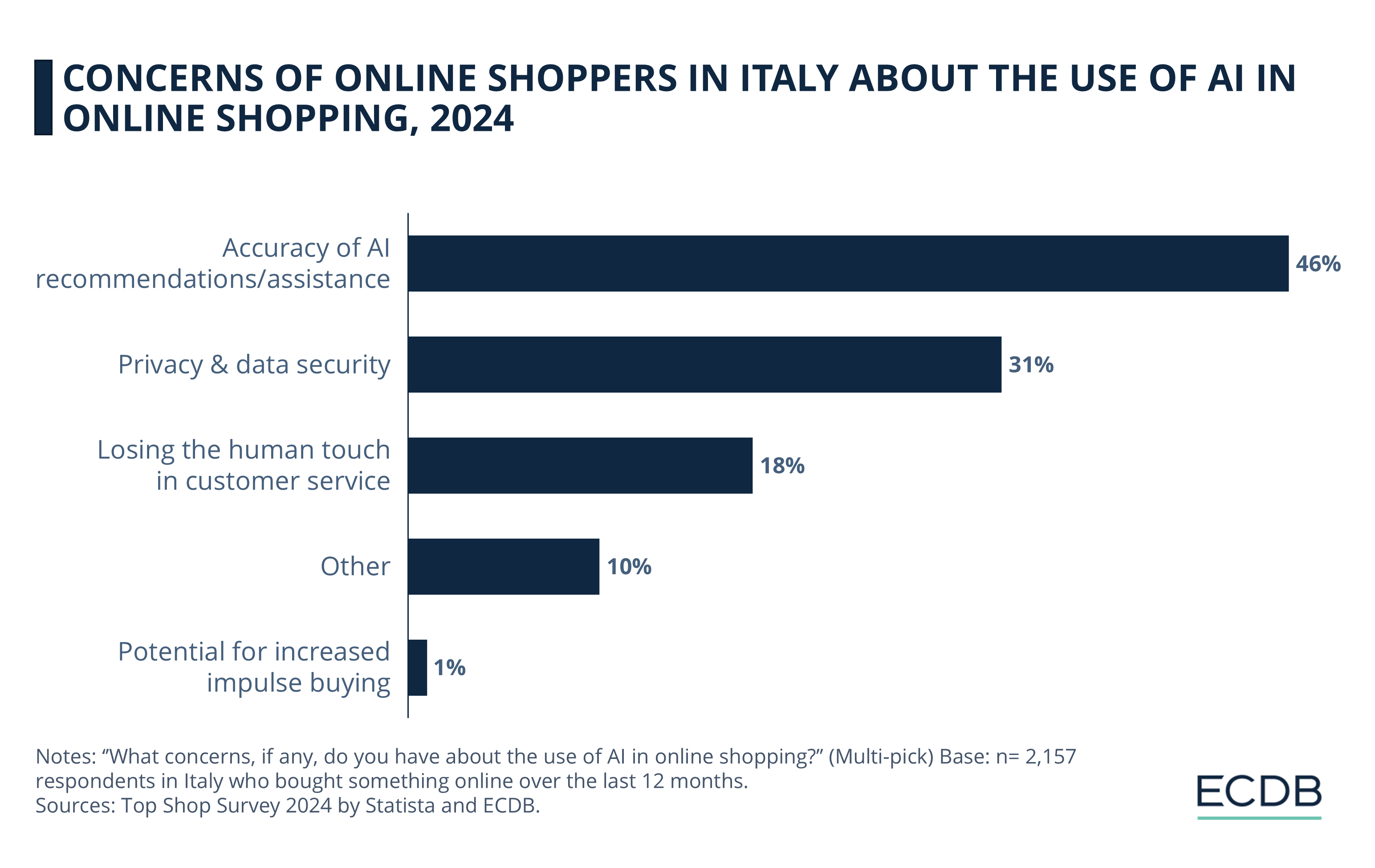
The accuracy of AI recommendations or assistance is the top concern, with 46% of shoppers expressing worry in this area.
Privacy and data security concerns follow, with 31% of shoppers highlighting these as important issues. A smaller group, 18%, is concerned about losing the human touch in customer service.
Meanwhile, 10% of shoppers have other concerns, and only 1% are worried about the potential for increased impulse buying due to AI.
Female shoppers are more concerned about privacy and the potential loss of human interaction in customer service, while male users are more focused on the accuracy of AI recommendations. Older users are generally worried about losing human customer service, whereas younger shoppers are more concerned with the accuracy of AI.

Lower-income shoppers tend to focus more on the potential loss of human interaction, while high-income consumers are primarily concerned about the accuracy of AI recommendations. Single-person households are more anxious about the potential for impulse buying, while medium-sized households, with three people, express the most concern about privacy and accuracy.
Although shoppers in larger cities are generally more positive about AI’s potential, they also express the most concern about privacy and accuracy issues.
Artificial Intelligence in Italy’s eCommerce: Final Thoughts
As online shoppers in Italy grow more comfortable with AI tools like chatbots and personalized recommendations, we can expect a shift from cautious curiosity to widespread adoption, especially as younger, tech-savvy generations become the dominant shoppers.
Privacy and accuracy concerns will persist, however, requiring companies to focus on transparency and data protection to maintain trust. The AI eCommerce market’s growth seems poised to last, but its long-term success will depend on balancing innovation with addressing consumer concerns.
Sources: Decode39, Microsoft, Statista, ECDB

Click here for
more relevant insights from
our partner Mastercard.
Related insights
Deep Dive
Next Generation eCommerce: Key Trends Shaping the New Age of Online Retail
Next Generation eCommerce: Key Trends Shaping the New Age of Online Retail
Deep Dive
Google's AI Project Jarvis Could Change Online Shopping
Google's AI Project Jarvis Could Change Online Shopping
Deep Dive
FTC’s New Ban in Effect & How to Spot Fake Reviews in Online Shopping
FTC’s New Ban in Effect & How to Spot Fake Reviews in Online Shopping
Deep Dive
How to Avoid Online Shopping Scams Ahead of the Holiday Season
How to Avoid Online Shopping Scams Ahead of the Holiday Season
Deep Dive
Amazon’s New AI Assistant Project Amelia Will Support Third-Party Sellers
Amazon’s New AI Assistant Project Amelia Will Support Third-Party Sellers
Back to main topics